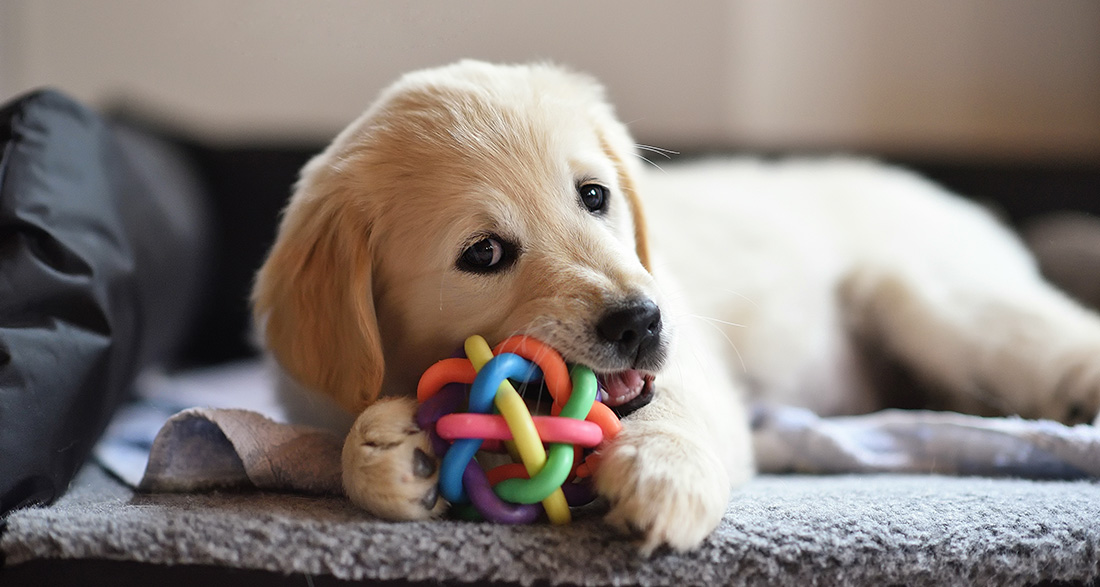Your new family member – an adorable puppy – has finally moved in with you! You’ve made everything “puppy-proof” and got everything he needs. You’ve taken time for the little four-legged friend, and he’s slowly getting used to being with you.
But now, his teeth suddenly become a problem: your puppy chews and bites on everything that comes his way. During play, he bites your fingers and hands and tugs at pant legs. He nibbles on furniture and chews on shoes. There are various reasons for this behavior. We’ll outline the main causes and provide you with tips on how to manage your dog’s unwanted biting and chewing behavior!
Why do puppies nibble on everything and bite everywhere?
Firstly, it’s important to know that biting during play and nibbling on objects is entirely natural behavior in a puppy. Puppies are born without teeth, but between the third and sixth week, their milk teeth start to come in.
Once the teeth become noticeable in the puppy’s mouth, he instinctively wants to use and test them.
The itching sensation during teething is accompanied by an increased urge to nibble on and chew everything. Additionally, puppies explore and discover their surroundings in this way. But beyond that, there may be other reasons why your puppy bites and nibbles:
- Boredom
- Lack of exercise
- Overly enthusiastic play invitation
- Exploration of unfamiliar objects
- Stress and overwhelm
- Separation anxiety and fear
- Feeling hungry
- Joint disease (the dog constantly chews on its paws and joints)
How can you train your puppy to stop biting and chewing?
With careful investigation into the causes, a bit of patience, our practical tips for puppy training, and training bite inhibition, you can surely handle the issue well. Here’s what you can do so that your puppy doesn’t bite and nibble on everything:
Train bite inhibition
Normally, puppies learn bite inhibition during play from their pack. Sibling puppies and adult dogs won’t tolerate the puppy biting and will snap back. This teaches the puppy that a bite causes pain and is not tolerated. However, you can also teach your puppy bite inhibition: yelp loudly when the puppy bites. If your furry friend doesn’t stop, then say “No!” or “Stop!” loudly and clearly and walk away for 20 seconds. Physical isolation is a strong signal for the puppy that it has done something wrong.
Let your hand go limp when the puppy bites
Instead of instinctively pulling your hand away, it’s better to let your hand go limp. Sudden movements might encourage your dog to play more vigorously and bite harder, as movement in dogs stimulates the hunting instinct. Playing with a limp hand is much less fun!
Reward your puppy when he shows positive behavior
Between bite attacks during play, the puppy might try to comfort you and lick you. You can then praise him with words or a reward. This way, you can encourage and reinforce his positive behavior.
Let your puppy play with other dogs
This way, your puppy learns in a natural way from his peers what behavior is desirable during play and what is not okay!
Use deterrents with an unpleasant taste
Supportively, you can apply a deterrent to your hands and clothes before playing with the dog. This could be, for example, cold balm, tea tree oil, or white vinegar. After two weeks, your puppy should develop an aversion to it, and he won’t bite your hands, ankles, or clothes anymore.
Offer alternative chew toys
Every time the puppy bites your hand, clothes, or unauthorized objects, you should offer him an alternative toy that he is allowed to nibble and bite on. Withdraw your fingers or the forbidden object with a corresponding command (“Shame” or “No!”) and offer him the alternative toy (e.g., rubber ball, play rope, chew bone, dog stuffed toy). You should provide him with a selection of interesting toys to keep him busy and prevent boredom.
Ensure sufficient exercise
A tired dog is often a well-behaved dog. If your dog gets enough exercise and is well stimulated, he won’t have to channel his unrestrained energy into overly playful biting.
Feed frequently
Since puppies have small stomachs, not much fits in. Therefore, your puppy should be fed up to five times a day throughout the day to ensure he is full. Feelings of hunger can also be a reason why your puppy bites into everything and gnaws on everything. With our special puppy food from PURINA-PRO PLAN, you ensure that your dog receives all the essential nutrients he needs during the puppy stage!
Provide quiet periods and relaxation
Perhaps you mean well and do too much with your cute little friend. Or there’s just too much commotion for the little one at home, and he needs more peace. But even here, chewing items can provide relaxation. Chewing on a chew bone or playing with a dog toy or towel can help the little one relieve stress and process his impressions.
Conclusion
Don’t give up Especially with dogs with a strong hunting instinct, it may require some patience and perseverance to train them not to bite. If problems persist, experienced dog trainers or attending a “puppy school” can surely help you further.


